The global pandemic has made us pick up new hobbies to fight boredom. Some of us have decided to purchase a new acoustic guitar. Others simply may have the urge to clean the dust from the old and forgotten wooden instrument.
Learning to play this demanding yet rewarding piece of fine wood is a challenge on its own. But many of us leave out the other important part of guitar ownership: maintenance. Acoustic guitars are delicate and vulnerable against even the slightest differences in temperature, humidity, and dust.
The wood on the guitar still thinks it is a tree, so you must treat it respectfully. Proper maintenance on your guitar prevents it from cracking and helps to preserve its fantastic sound and value.
In this post, I will be guiding you on how to:
- Clean your guitar properly
- Maintain it correctly
- Do the little things to ensure its longevity
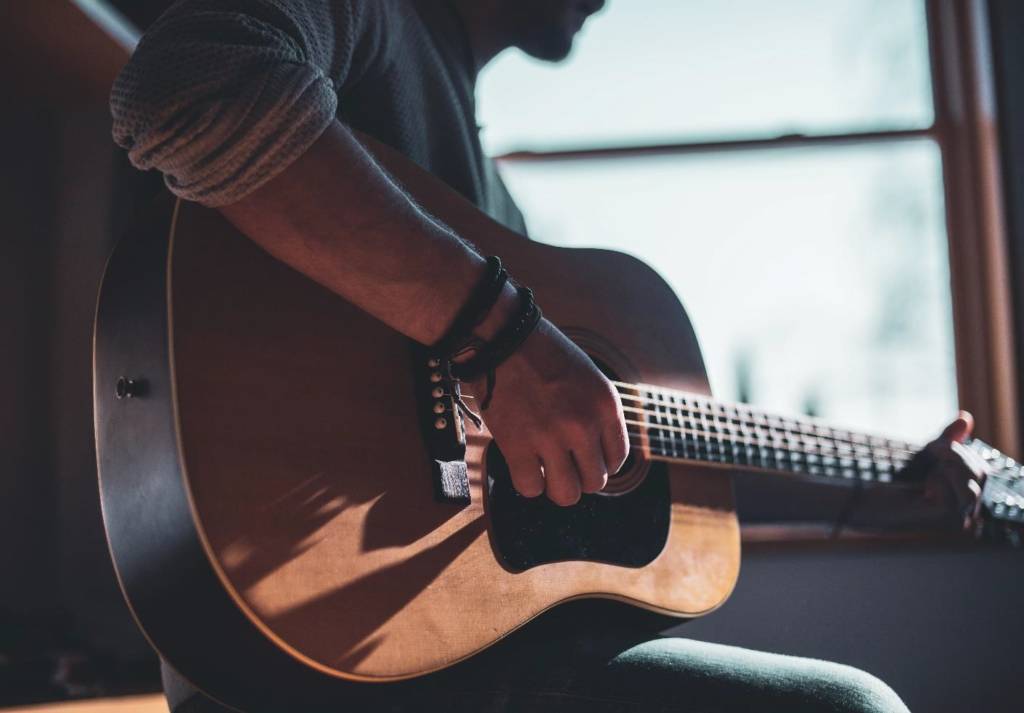
Clean your acoustic guitar frequently
For many of us, the acoustic guitar is an investment. The cost of a new guitar varies between 100 EUR and 7000 EUR, so looking after your guitar should be a no-brainer. The most important piece of advice is to always clean.
Wash your hands before playing your guitar. You would not grab your 1500 EUR MacBook with filthy hands, would you? Also, make sure that you let your hands dry correctly so that the guitar will not be exposed to water.
You are cleaning your guitar after a session is a great way to maintain its good condition. Every time you are playing, dust and sweat will transfer from your fingertips, especially to the fretboard. As the sweat evaporates, it dehydrates the wood, and in the long run, it may cause some nasty cracks. The key is to clean your guitar frequently.
For everyday use, you could consider these guitar String wipes to help out the process.
Storing your guitar in its case prevents dust from building up on your guitar. More on this matter later.
When giving your instrument a more thorough cleaning, making a well-lit space to spot all the little dirty spots is convenient. Using, for example, an ironing rack gives you a proper working table.
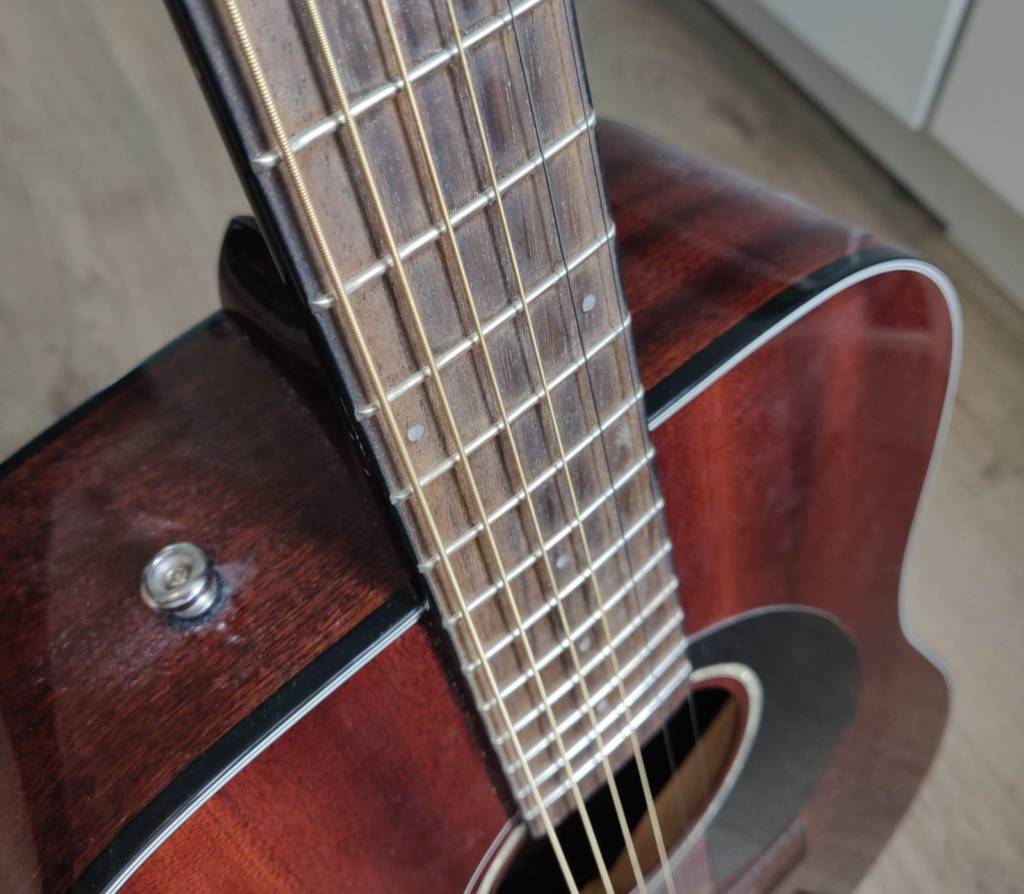
Clean your fretboard
Fretboard, also known as the fingerboard, is the part of your guitar where you bend the string against the wood during your most excellent solos. Usually, your hand slides back and forth the neck to play along with your
favourite songs. You provide the best possible sound quality by ensuring your fretboard is clean from sweat, dust, and dead skin cells.
Removing the strings before cleaning your fretboard makes it much easier to access all the spots. I recommend doing this more precise cleaning at the same time you change your strings. More on that process at the end of this post.
The easiest way of cleaning your fretboard is by applying this Jim Dunlop’s Lemon oil. Moisture a cloth with oil and gently wipe the fretboard with it. It is good to brush in a circular motion for even distribution of the oil. This oil hydrates your fretboard as well as removes the dust and fingerprints. Remember to avoid using too much oil, as the fretboard could become too moist. This may cause severe warps and potentially destroy your beloved guitar.
Most acoustics guitars have either Ebony, Maple or Rosewood used in their fretboards. Cleaning them is almost the same, but as the maple is lighter coloured, you must be more careful handling it. You should not use lemon oil on fretboard made from maple.
Please avoid using any paper towels as they leave tiny bits of paper on your instrument.
Clean the body of your acoustic guitar
Cleaning the body of your acoustic guitar is more accessible, as nothing needs to be removed for it. Most of the mass-produced guitars are finished with a polyester or polyurethane finish. This means that the outer parts of your guitar are not wooden. These finishes make cleaning easier as they hold the wooden pieces from absorbing the polishes or waxes you are using.
The best way of deciding which polish to use on your guitar is by asking from its vendor or producer. Please pay a visit to your local music shop and ask for their opinion. Every guitar is unique and needs proper care. Only an experienced eye can determine which products to use.
Make sure not to use previously mentioned lemon oil on the body as it may dull the finish. The same applies to everyday household cleaning products.
Avoid spraying polishes straight into the guitar. This may lead to a too moisturized finish. Dampen the cloth and clean the body with it.
IMAGE
How to ensure the longevity of your acoustic guitar?
As mentioned earlier, the acoustic guitar is a delicate piece of wood. It does not withstand significant differences in temperature or humidity. The rule of thumb is that your guitar likes the same climate as you do. Roughly 21 °C or 70 °F. The ideal relative humidity for your guitar is between 40 % and 50 %.
How could one know whether the guitar is too dry or too moist with such fine lines between proper and improper climates? The best way is to use a hygrometer. The most accurate and convenient by far is RuuviTag. Thanks to its small size, precise measurements, and mobile phone application, it gives cheap insurance on your valuable guitar.
Here is a video about how RuuviTag works in a guitar case!
Where to keep and store your acoustic guitar?
The very best place to keep your guitar is in its case. A hard case is the best as it secures the delicate guitar from hits. Controlling the microclimate in a bit of case is more accessible than maintaining a whole room. And as mentioned earlier, the case prevents dust from building on your guitar. Thanks to its small size, RuuviTag fits perfectly inside your case. You can also set alarms to the application to alert you if either temperature or humidity does not match the desired state.
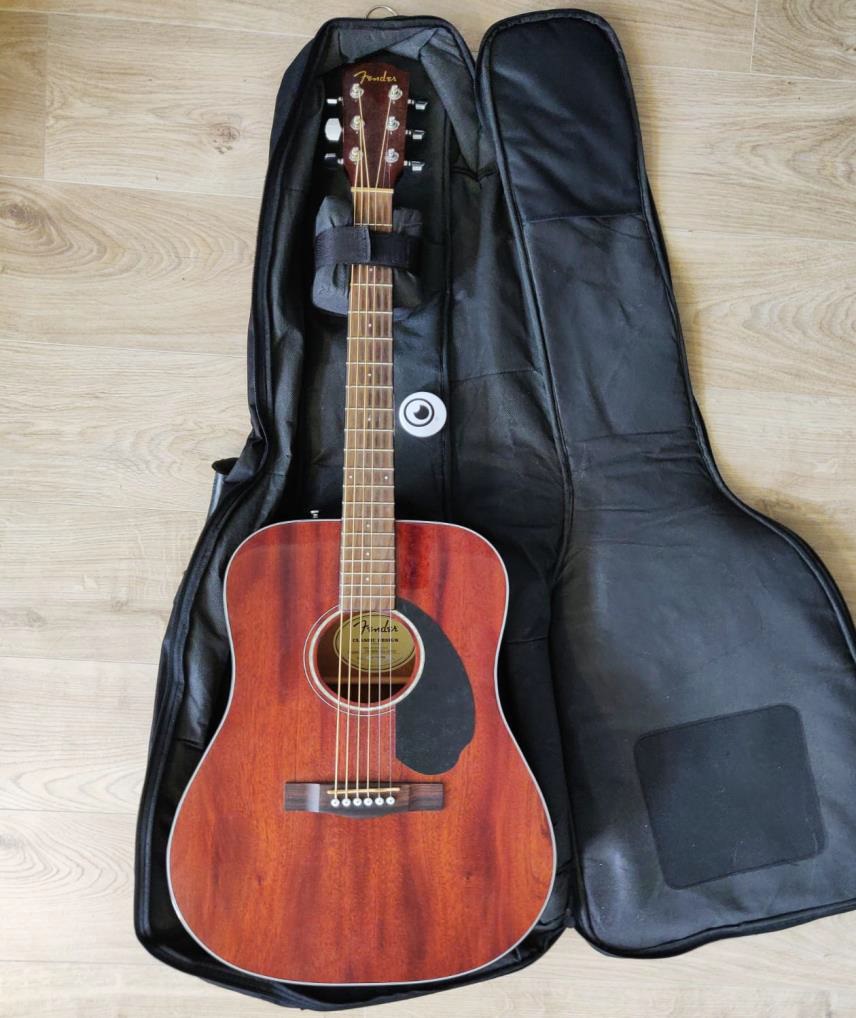
You could use, for example, These humidity packs to keep the humidity level at the desired condition.
But if you want to admire the beauty of your wooden instrument as I do, you can store your guitar in a stand on the floor or the wall with a hanger. Shelves and hangers are inexpensive, and you will find them in your nearest music store. Make sure to keep your guitar from falling or taking any damage, as even the tiniest hit could destroy the guitar.
When deciding a place to keep your guitar, you could examine it first with RuuviTag. Your guitar requires a stable temperature with stable humidity, so any drafty spot should not be considered.
These bad spots are usually near.
- windows
- fans
- fireplaces
- heat ventilations.
I, for instance, found just a perfect spot from my apartment where the humidity and temperature are ideal by using RuuviTag. It gives me peace of mind to know that my guitar is not drying slowly while not giving it attention.

How to keep the environment optimal? Learn the know-how.
Once you know your room’s temperature and humidity levels, you could take a look at this article about How to control the humidity in your guitar & instrument room. If you are not ready to invest in an air humidifier, you could pick up some new information on humidifying a room naturally.
Humidifying your room is especially important during winter months in colder climates, as the room’s humidity may decrease drastically.
It is also good to keep your guitar away from direct sunlight and places where it could potentially fall.
While you are monitoring your guitars well-being, the statistics from RuuviTag also helps you to sleep perfectly.
What else can I do? Taking care of your acoustic guitar is crucial.
Now we have walked through the basic skills you need to maintain your guitar correctly. Even though learning to play this instrument is time-consuming and sometimes frustrating, I recommend you push through it. Constant usage is excellent for your guitar, as you remember to take care of it frequently.
In case of a crack or some other major problem with your guitar, you should consult a professional in your area. A professional knows best and will be able to help you restore your guitar. It is wise to check now and then your guitar’s condition from an expert.
Conclusions
With these steps, you will be able to take good care of your acoustic guitar. Frequently cleaning and properly storing it benefits its sound, overall condition, and value as well.
As your guitar is unused most of the time, RuuviTag is a cheap yet reliable way of ensuring the perfect conditions for your guitar. With its mobile application, you can conveniently ensure that the humidity and temperature are always at the right level.
Buy a Smart Sensor to Keep Instruments Safe
Ruuvi is an easy way to ensure your musical instruments are stored in correct conditions. With proper storing, your guitar will last and stay in tune longer.
39,90€
Ruuvi is based in Finland. If you’re an EU consumer, VAT is included. If you’re a non-EU customer, you don't pay VAT. If you're an EU business, insert your VAT ID at checkout.
In stock
RuuviTag Sensor (4in1)
| 5 star | 90% | |
| 4 star | 10% | |
| 3 star | 0% | |
| 2 star | 0% | |
| 1 star | 0% |
Customer Images
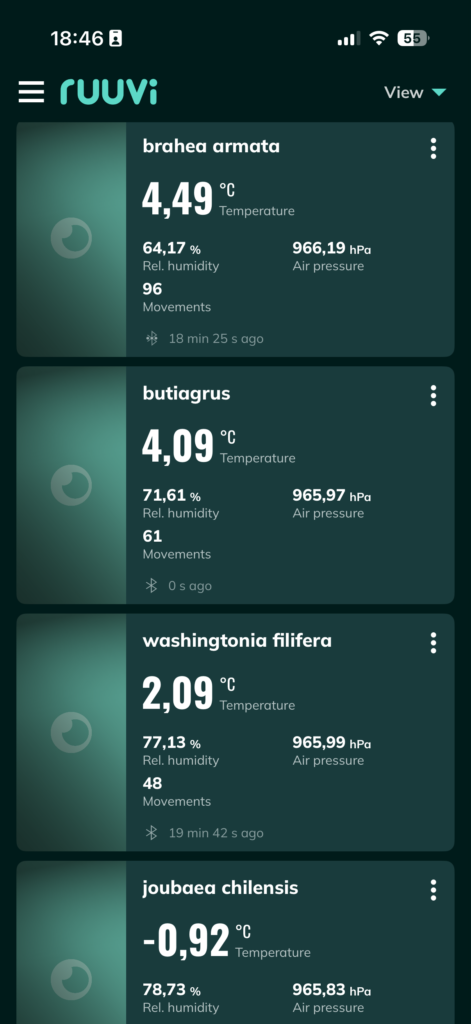
RuuviTag Sensor (4in1)
| Quantity | Unit Price(€) |
|---|---|
| 1 | 39,90 |
| 2 | 37,40 |
| 3-5 | 36,90 |
| 6-8 | 35,90 |
| 9-12 | 34,90 |
| 13-25 | 33,90 |
| 26-99 | 32,90 |
Are you looking for bigger quantities? Contact us for pricing.
FAQ
Can my acoustic instrument get damaged with the wrong humidity level?
Yes, due to the nature of wood, there is only a small range of humidity which ensures a perfect condition, e.g. a long life of your instrument. Keeping the wrong levels for too long will result in damage and high costs.
How can Ruuvi technology help me with this problem?
By having a modern measurement tool like our Ruuvi sensor, you can monitor the humidity and temperature levels right in your home – all the time.
Click here to go to measurement use cases.
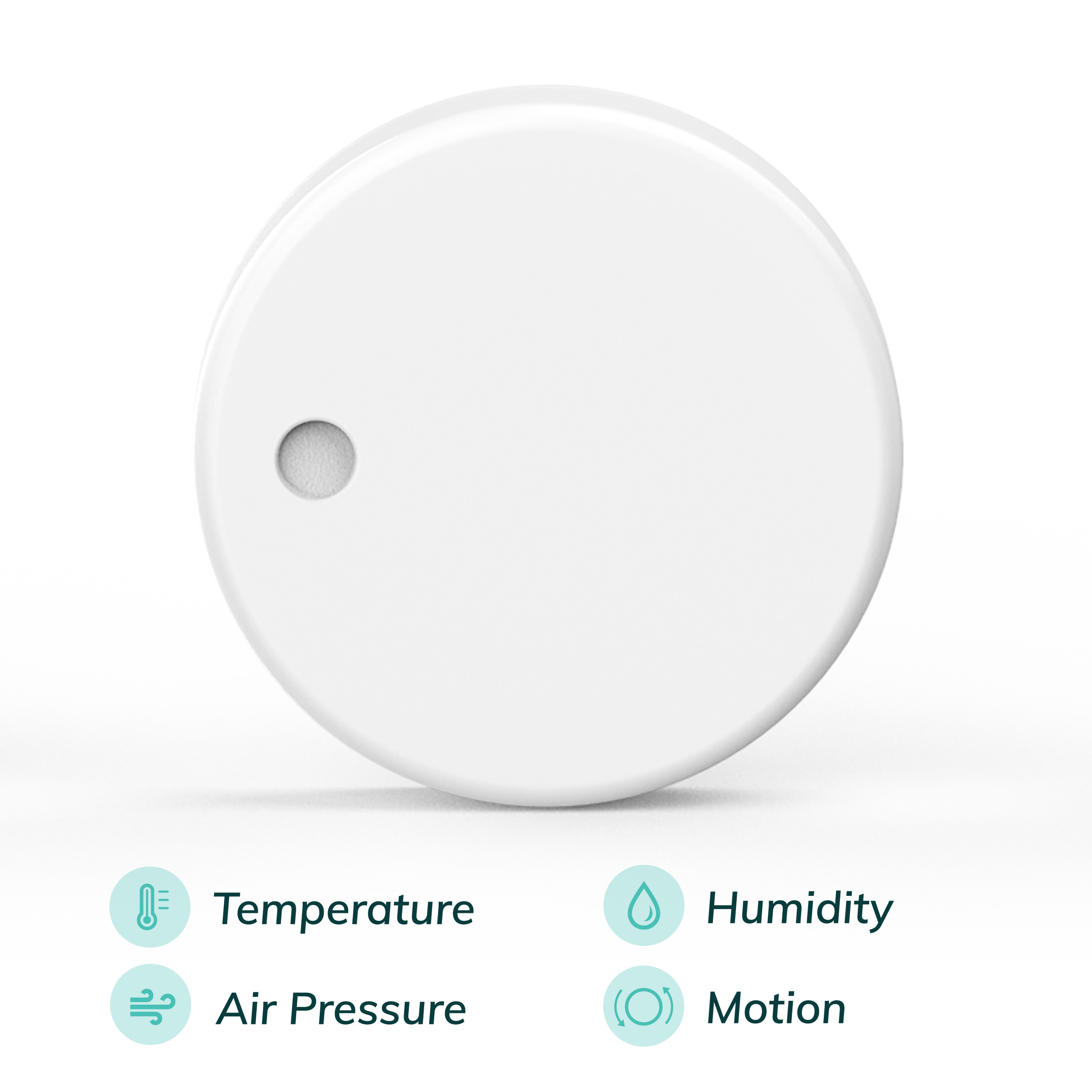
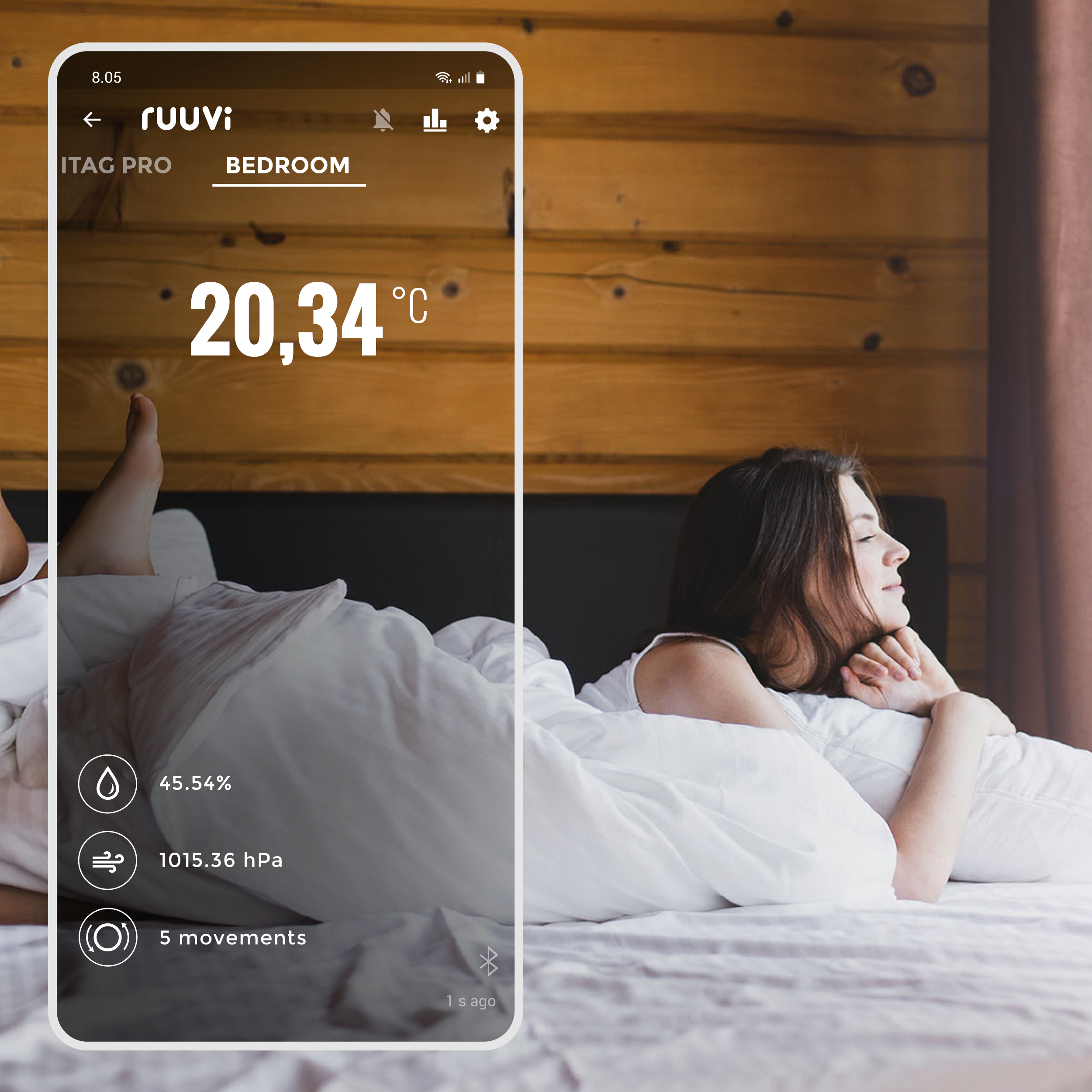
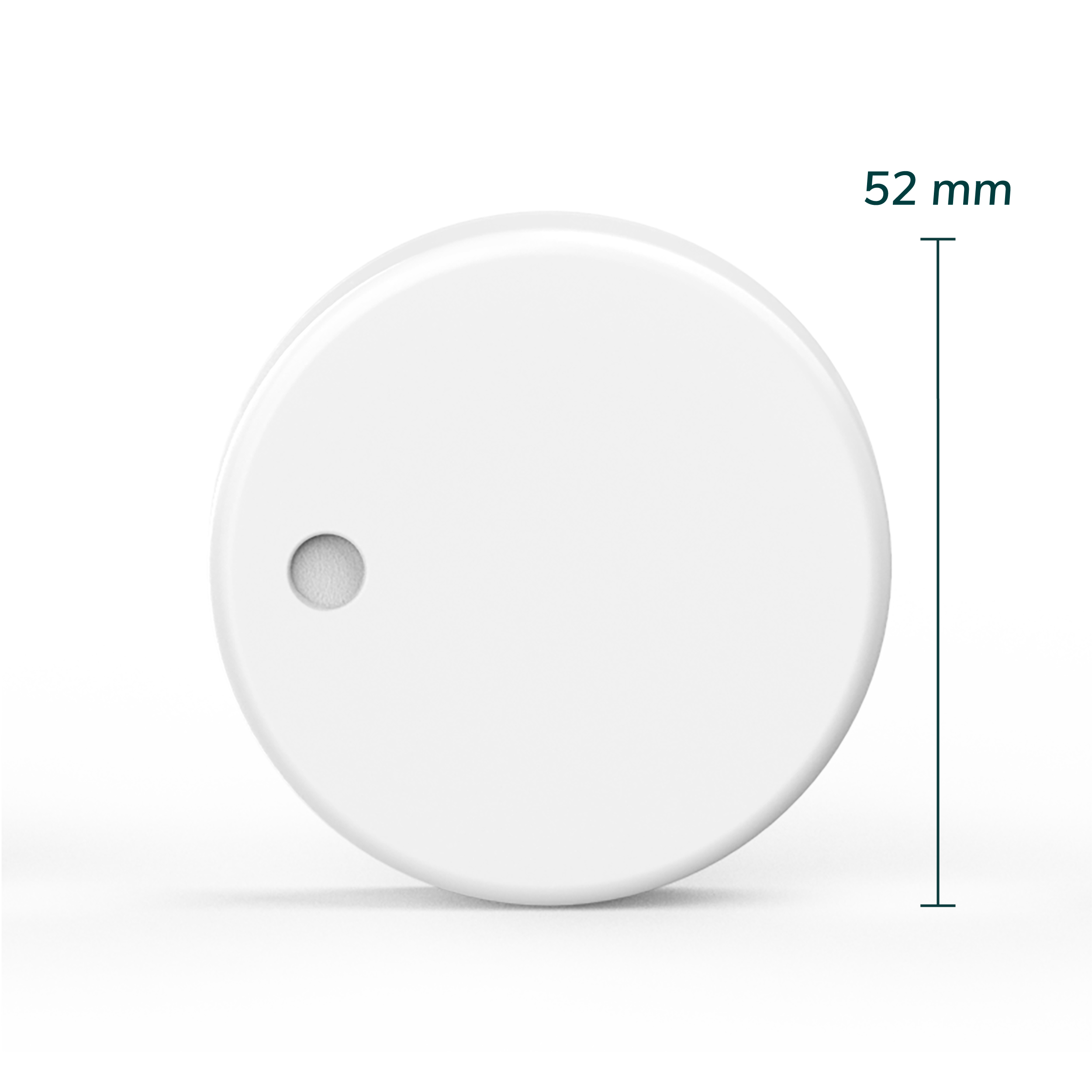
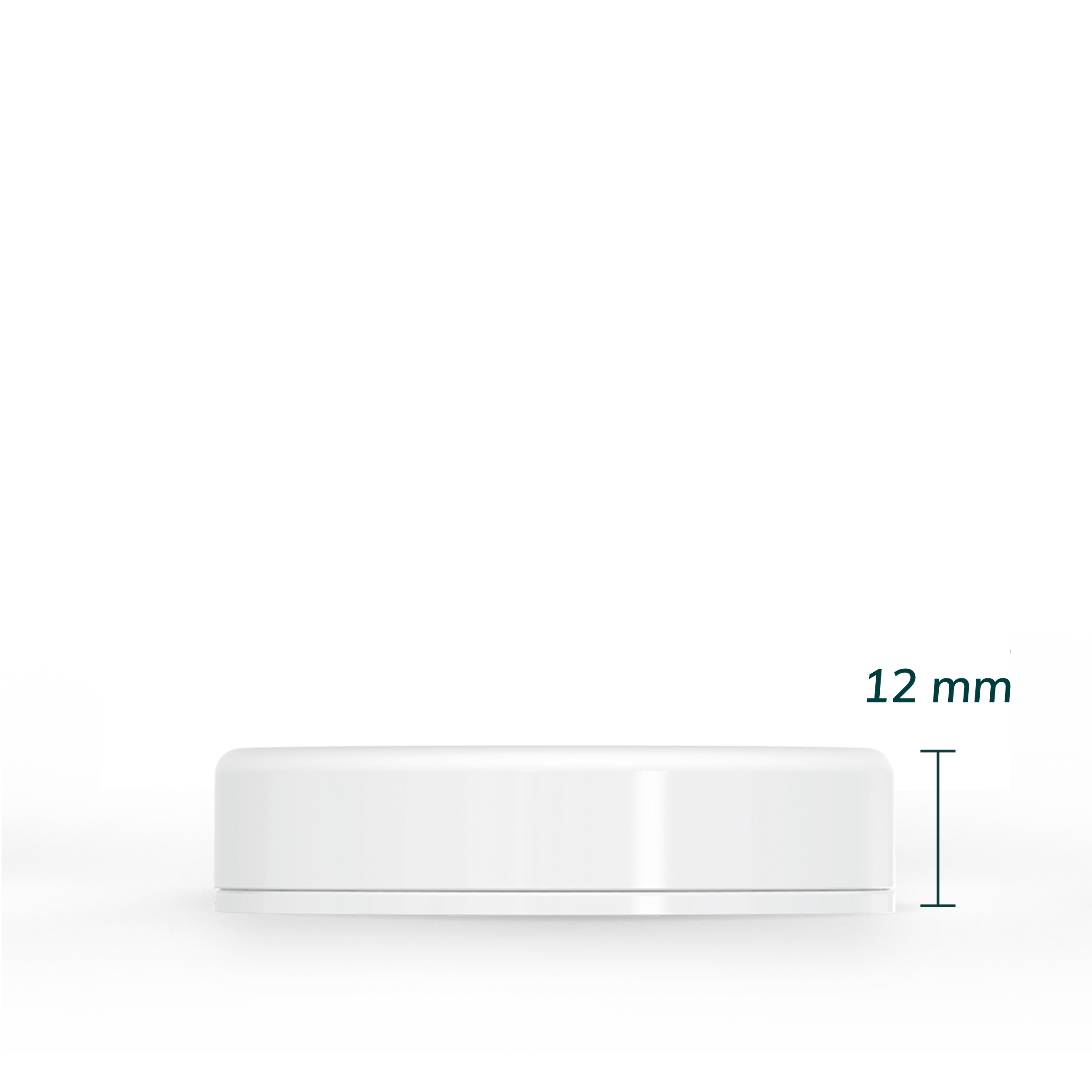
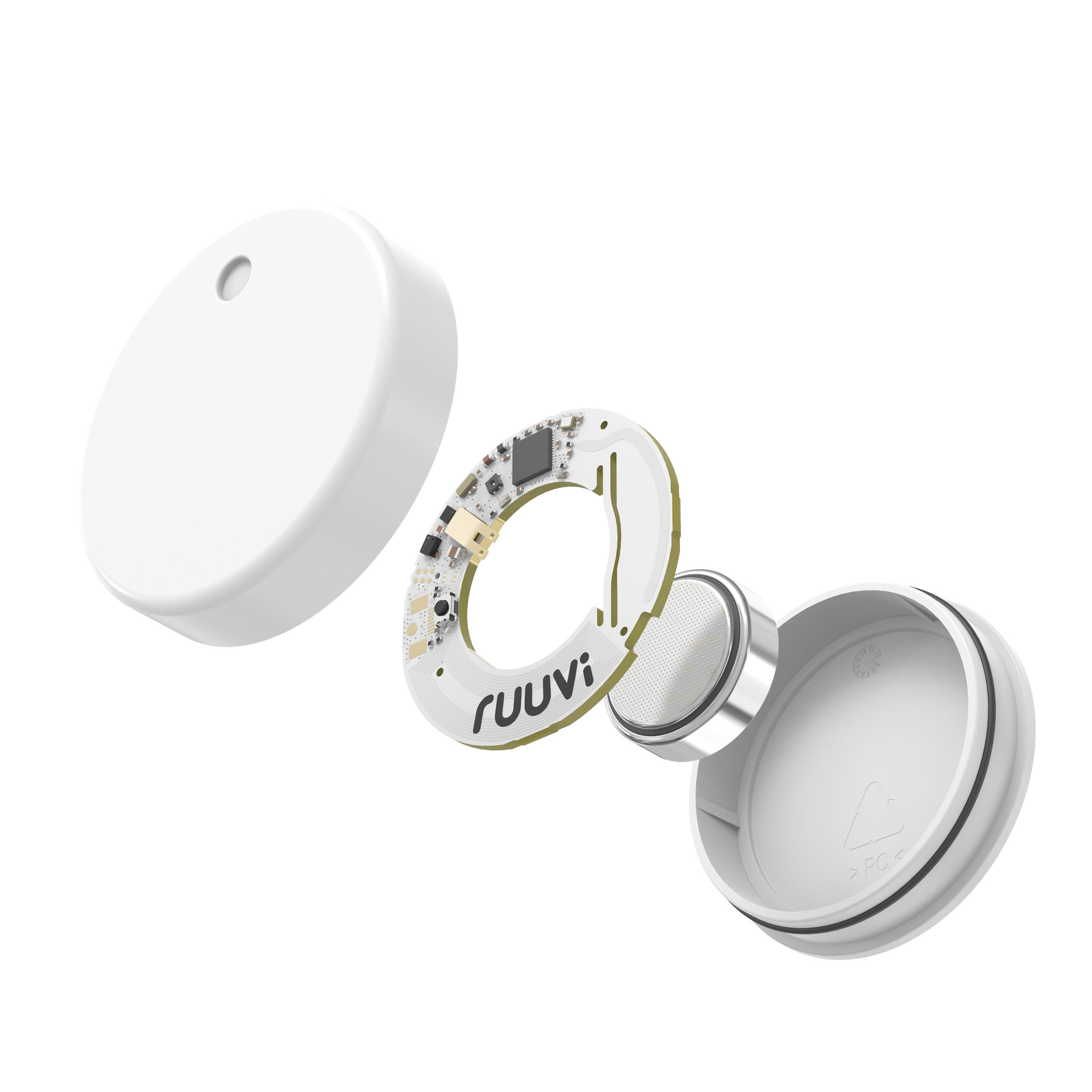
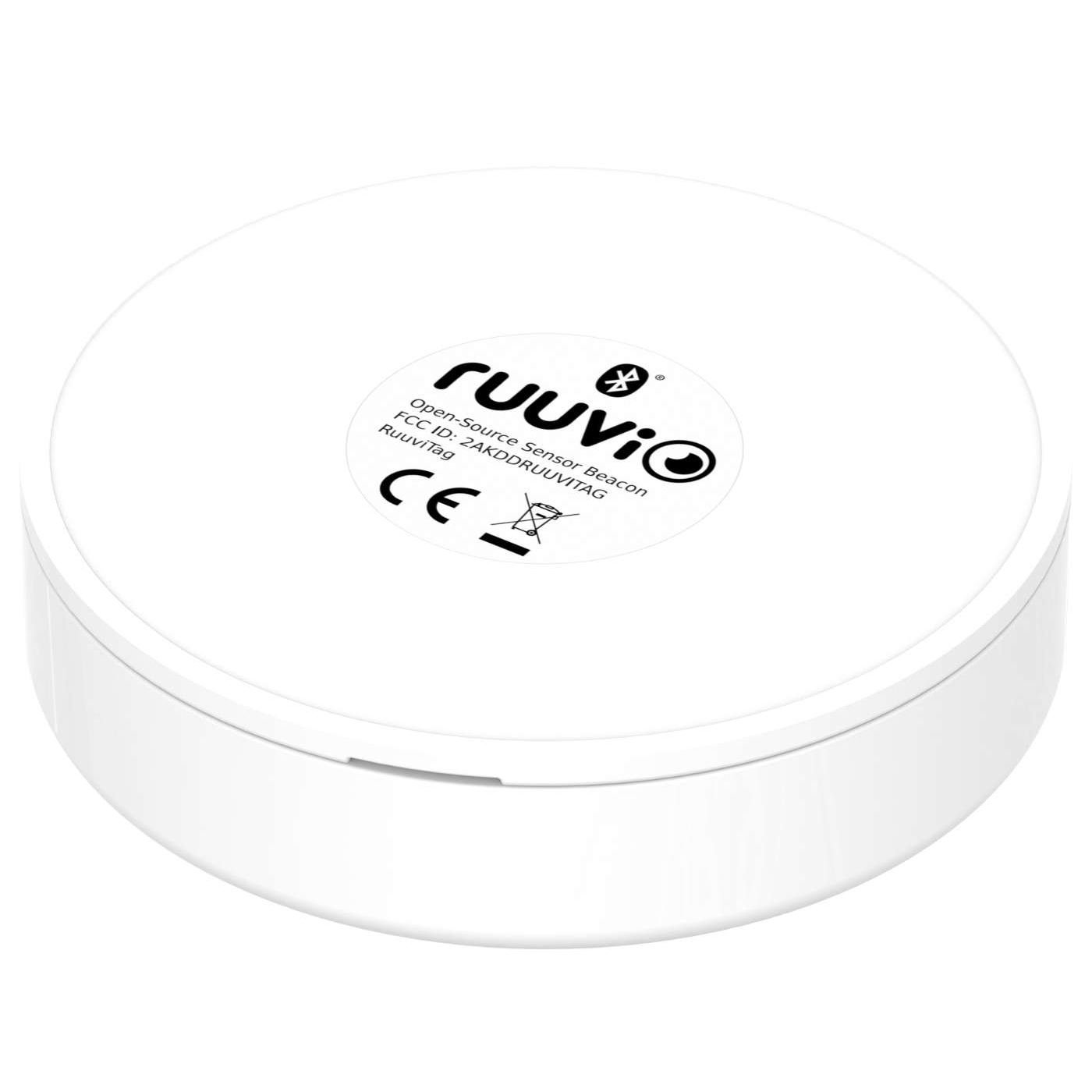
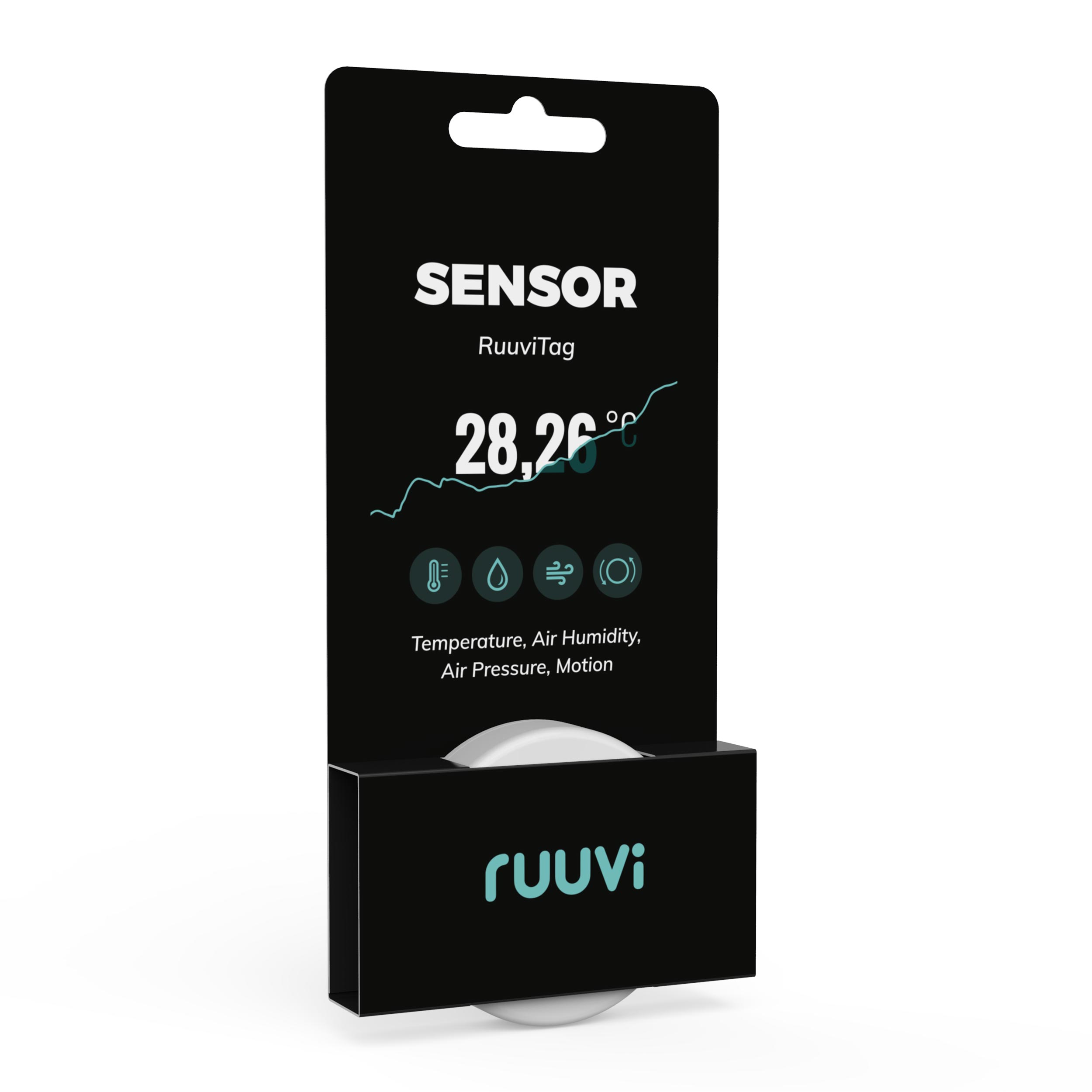
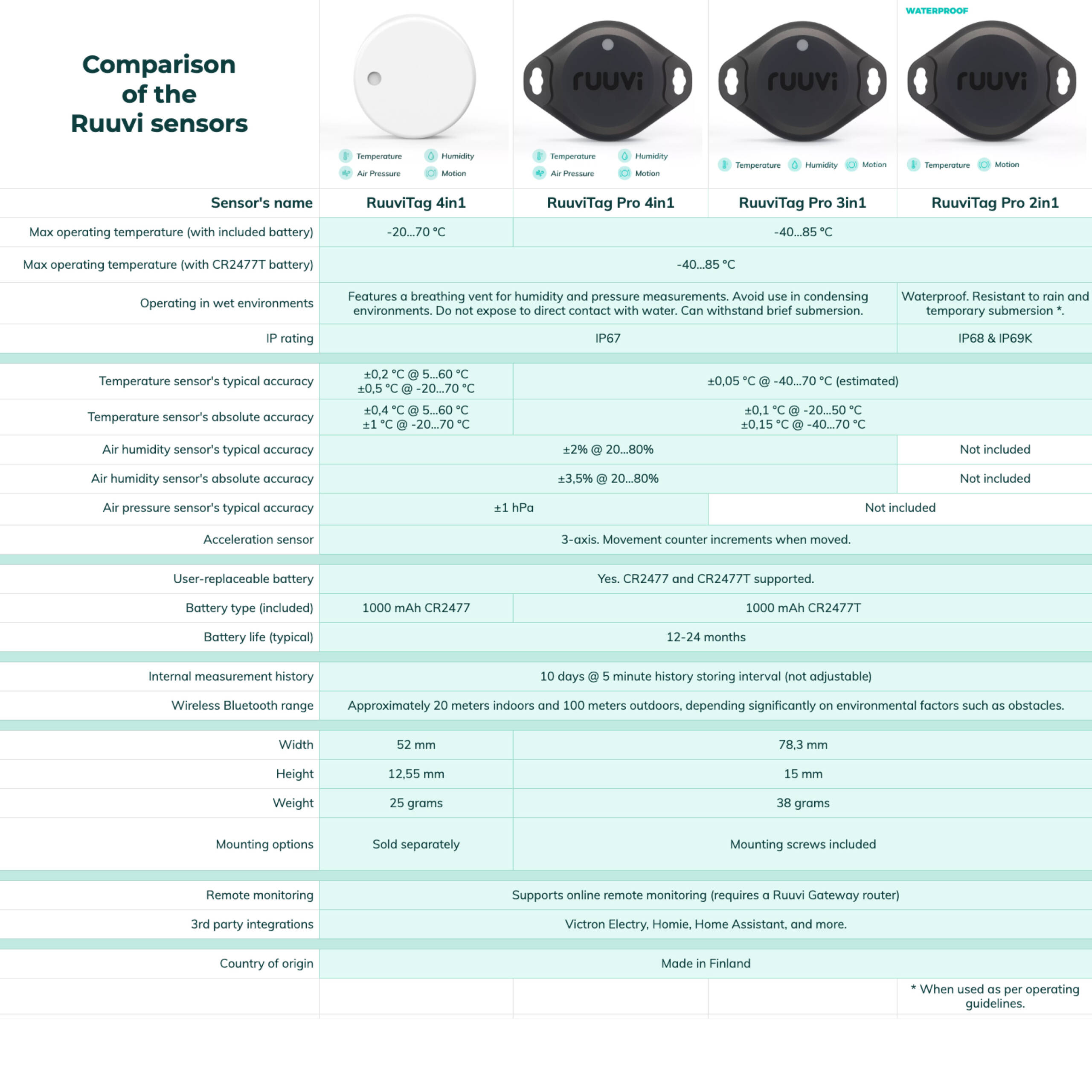

We really love it.
Great product
Fantastic product works great with Victron Cerbo Gx!
Immediate connectivity via Bluetooth and able to see how my palms are doing in their heated winter polycarbonate boxes temperature.
Love the RuuviTag sensors!!!